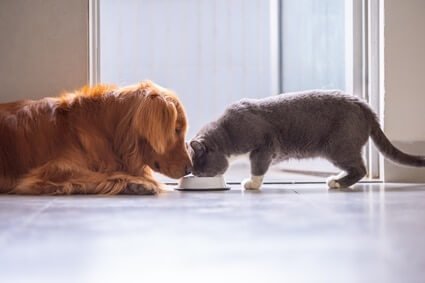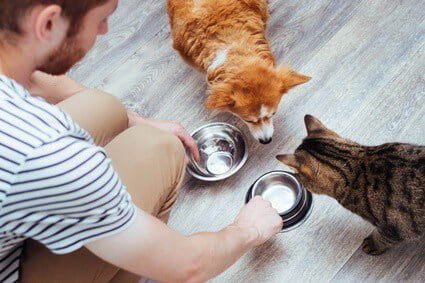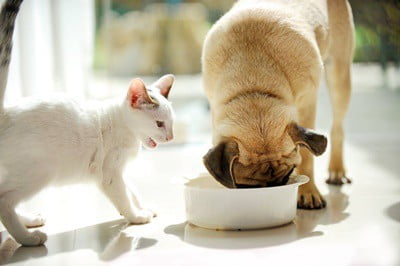In an emergency, we make do with what we have. Sometimes that means feeding dog food to our cats. It’s not ideal, but it’s better than letting them go hungry. In the short term, dog food is a safe alternative for cat owners with no other options. It’s designed for an omnivorous animal, and cats are strict carnivores, but it will be okay for 3-4 meals.
Cats can have dog food in emergencies because it has calories and is non-toxic. Starvation will harm a cat far more severely than dog food ever could. However, it’s not nutritionally balanced and shouldn’t be fed long-term. In fact, it lacks taurine, Vitamin A and only contains half of the daily protein that a cat requires.
These result in weakening muscles, blindness, heart problems, and fatigue. Of course, the symptoms won’t crop up until several days (or occasionally weeks) of feeding. When picking your options, wet dog food in large chunks should be diced into a finer mix. Dry dog food kibble that is large enough to choke on should be crushed into smaller pieces. Dog treats should also be safe for cats to eat, but dental treats must be avoided.
Can A Cat Eat Dog Food Once?
Cats can safely eat dog food for 3-4 meals. If absolutely necessary, this can be for a longer period, upward of a week. However, you will notice some effects on the cat’s health after 1-2 meals. This will include:
- Diarrhea
- Constipation
- Slight lethargy
- Inactivity due to poor energy reserves
These symptoms will resolve themselves after the cat has returned to its normal food. The faster you can get it switched over, the better. It is difficult to say how long a cat can sustain itself on dog food. It takes a few weeks for the body to begin weakening and the vision to suffer from a lack of nutrients.
Difference Between Dog Food And Cat Food
The nutritional needs of cats and dogs are vastly different, even though both belong to the Carnivora order. Dogs are misunderstood to be carnivores by many. In truth, dogs are omnivores, according to General and Comparative Endocrinology.
A canine’s diet must have a variety of grains, vegetables, and fruits, alongside meats. In comparison, cats are strict carnivores. They don’t need vegetables, grains, or fruits in their diet. All the nutrition they require can be derived from a wholly meat-based diet.
Even though cats are capable of digesting plant matter, they cannot do so efficiently. In fact, some uncooked vegetables are impossible for a cat to digest and will be passed whole. Likewise, felines cannot extract enough nutrients from the matter to keep up their health. Although a carrot may be packed with vitamin A, for example, a cat will only get a tiny portion of this.
Instead, vital nutrients for cats must be derived from animal proteins. Taurine is the most important one, with vitamin A following closely behind. Dog food contains little to none and far less protein than cat food.
Taurine
Taurine is an amino acid that plays an important role in metabolic processes. Without it, cats become lethargic, suffer from digestive issues, and develop unhealthy skin and fur. This can escalate quickly. Cats that are left untreated may suffer from:
- Impaired sight
- Eventual blindness
- A weakened heart
Since cats are unable to produce this vital amino acid themselves, they must have a steady source of dietary taurine. The highest amounts can be found in fish and some types of dark meat. The most prominent include turkey and chicken.
Dog food, although containing meat, does not provide enough taurine for a cat to live on healthily for a prolonged period. In fact, most dog food brands offer a blend of beef, pork, mutton, and goat meat.
In cats, taurine deficiency is a prevalent nutritional problem, as noted by Veterinary Clinics of North America: Small Animal Practice. It most commonly occurs when cat owners try supplementing their cat’s diet with homemade food, dog food, or vegetables.
Vitamin A
Vitamin A is vital for eyesight, healthy skin, and immune system health. Unlike cats, dogs are able to produce their own supply by converting beta carotene into Vitamin A. Cats lack this ability, so their entire supply of Vitamin A must come from food.
Deficiency in this vitamin can result in blindness, similar to taurine deficiency. It can also lead to deteriorating skin and fur quality, and weakness of the muscles. If your cat eats dog food for more than 3-4 meals, the early symptoms may begin to crop up.
Protein
As obligate carnivores, felines have evolved to eat meat and only meat. Unlike dogs, which consume carbohydrates and animal protein, cats mainly rely on protein for energy. If you deprive them of protein or consistently give them an inadequate amount, their body will feel the impact.
Dog food does contain protein. However, the amount is nowhere near what cats need as a part of their daily meals. In fact, it’s estimated that cats need double the amount of protein as dogs.
Of course, you may try to compensate for that by using puppy food. This is often packed with additional protein and vitamins to help fortify a developing canine’s body. While this may seem efficient, it’s a surface-level fix. The individual servings will continue to have a too-small amount.

Will Dog Food Harm My Cat?
Cats will not be harmed by dog food if they’re given it short-term. Although nutrient deficiencies can be dangerous, a cat’s system won’t collapse overnight or even within a couple of days.
Starvation is far riskier and may leave your cat to waste away in a far shorter amount of time. You can be certain: it’s much better to give cats dog food than it is to offer no food at all.
Just be aware that there may be side effects. If your cat has an allergy to one of the ingredients found in dog food, it may become sick. Likewise, dog food has a much higher fiber content than cat food. This may cause bloating and constipation.
On a comforting note, any sudden change in diet can do the same. If you’ve ever swapped out your cat’s brand of food before, you will be familiar with the symptoms. The cat will recover in the same way, too.
Your cat may get diarrhea, which will be messy and uncomfortable. As long as it’s given a calm environment and plenty of water, your pet will be fine. Diarrhea is only harmful to cats that are extremely young or old.
Can Cats Eat Wet Dog Food?
Wet dog food is safe for cats to eat. It is palatable and won’t pose a choking hazard. The ingredients do not contain anything harmful or toxic to cats. Unless your cat has an allergy, it may even prefer the aroma and taste of the gravy.
Be wary of any dog food that is served as large chunks, though. It can be quite easy for a cat to choke on such lumps of food. If no other meal option is available, chop these large pieces into smaller bits before offering them to your cat.
Cats cannot eat wet dog food in the long-term. It should only be used as a substitute meal in dire circumstances.
Can Cats Eat Raw Dog Food?
In the wild, cats and dogs alike eat their food raw. In your home, though, it can be dangerous. Uncooked meat can be contaminated with bacteria and pathogens. This is true even from verified name brands, as the packing process may introduce all kinds of harmful contaminants.
There is also a risk of cross-contamination. Even if you clean the dishes after the cat has eaten, the cat itself can spread bacteria. If you can, avoid giving your cat raw dog food. The fact that it’s formulated for dogs isn’t the issue; it is the fact that it’s raw. Your cat may become quite sick, depending on the quality of the meat.
Can Cats Eat Dry Dog Food?
Like other types, dry dog food is safe for cats in the short term. The drying process does not introduce any harmful chemicals or ingredients. Like with wet dog food, you should break up the kibble into smaller chunks. Larger pieces may be difficult to chew, causing jaw pain, chipped teeth, or choking.
When giving dry dog food to kittens and young cats, you should be more cautious. They will be especially prone to choking. Their jaws are also smaller, so they may struggle to chew through even crushed pieces of kibble. Soften the food with warm water to make a lumpy slurry that has the consistency of oatmeal.
Can Cats Eat Dog Treats?
Outside of an emergency, you may still be tempted to offer your cat dog treats. If you’ve run out of the cat’s supply and only have Fido’s on hand, can they share?
Dog treats are not lethal to cats, and your cat won’t die if it eats one. However, treats are often designed to be flavorful, not healthy. Your cat may experience an upset stomach from the rich ingredients and the added flavorings.
More importantly, you should avoid treats that are plant-based or mixed with dairy. These cannot be properly digested and may be passed whole. As your cat’s stomach tries to process the food, that could leave it feeling worse than if it was denied outright.
Dental dog treats are completely off-limits. These are made specifically to maintain the health of your dog’s teeth. Since canines have impressive bite strength, their dentition varies greatly from that of cats. By offering a dental treats to a cat, you risk it chipping a tooth or choking on a piece of the treat. This includes:
- Dental bars
- Bones
- Dried pig ears
Can Dog Food Give My Cat Diarrhea?
A drastic change in diet will easily upset a cat’s digestive system. This may include switching between cat food brands but will include jumping to dog food. Diarrhea will likely persist until the cat has its own food again and may continue for a short time afterward.
With that said, your feline may have a resilient stomach. If it’s used to switching between different kinds of food, it might build up a tolerance.
If your cat doesn’t get diarrhea from the canine food, then consider it a lucky break, not a reason to continue feeding this option. The cat will still fail to gain the nutrients it needs long-term.
Can A Pregnant Cat Eat Dog Food?
Pregnant cats have large appetites, and those calories are direly needed. They’re literally growing several kittens in their belly. In a pinch, a pregnant cat can safely eat dog food. It’s far more dangerous to let her go hungry.
However, you should prioritize giving the mother normal cat food as soon as possible. As mentioned, cats are strict carnivores. There are valuable calories found in dog food that will satisfy hunger, but the omnivorous blend means that several of those calories are empty.
Pregnant cats are charged with producing all the nutrients their kittens need to grow and develop properly. If deprived of this for too long, the mother cat might become nutrient-deficient more quickly as her body pulls from her own stores to supply the kittens.
Remember that dog food lacks taurine, an amino acid essential for cats – even more so for pregnant or lactating mothers. Taurine deficiency impacts them severely, resulting in many health problems in the mother and her surviving offspring.
The Journal of Nutrition details these problems as neurological abnormalities and blindness, among others. If fed long term, a mother cat on dog food may even give birth to deformed kittens if they aren’t miscarried first. However, feeding it to a pregnant cat once or twice won’t hurt her or the developing kittens. The same goes for lactating cats.
Cat And Dog Eat Each Other’s Food
Outside of an emergency, you may find that your cat routinely snacks on your dog’s food. After hearing all the possible health risks above, you may be worried that it will harm the cat.
Luckily, dog food won’t harm your feline outright. Its body will use cat food as the primary source of energy and nutrients. Everything else is just a treat. The cat may experience an upset stomach, but it won’t suffer from nutrient deficiencies.

Why Does My Cat Like To Eat Dog Food?
It can be perplexing if your cat keeps trying to eat dog food when it has a constant supply of good-quality cat food available. Some owners imagine that their cats detect some nutrient deficiencies in their own food, but this isn’t the case.
Dog food has lots of different smells, tastes, and textures compared to cat food. The result is an appetizing snack. Likewise, a hungry cat will eat just about anything that smells eatable. If your cat is prone to gorging itself or eating when it’s not hungry, it may naturally be drawn to dog food as a snack that never runs dry.
How To Stop Cats Eating Dog Food
Air-tight containers are the best way to store kibble. This will not only keep the cat out but stop pests like roaches and mice from getting into the goods. It also has the benefit of preventing the kibble from going stale.
You can also feed the cat and dog in separate rooms and restrict access until the food dishes are empty. This stops the animals from picking at each other’s leftovers. Getting them into a routine and feeding them at the same time helps as well.
You can trade a grazing bowl of kibble for puzzle toys. Dogs love a good puzzle toy full of kibble, but cats are less interested in working for what is otherwise a free snack.
Is It Normal For My Cat To Eat Dog Food?
Your cat is not ill or abnormal if it readily eats kibble. It’s not uncommon for felines to taste-test dog food since it’s novel, tasty, and easy to find (especially if you have several dogs).
With that said, you shouldn’t consider feeding your cat dog food a normal routine. It can have negative impacts on its health after a few meals, and especially a week or more.
Offering your cat dog food once or twice in an emergency won’t cause any harm. In the long-term, however, it leads to Vitamin A, taurine, and protein deficiencies. In an emergency, we work with what we have but get your cat proper cat food as soon as possible.

